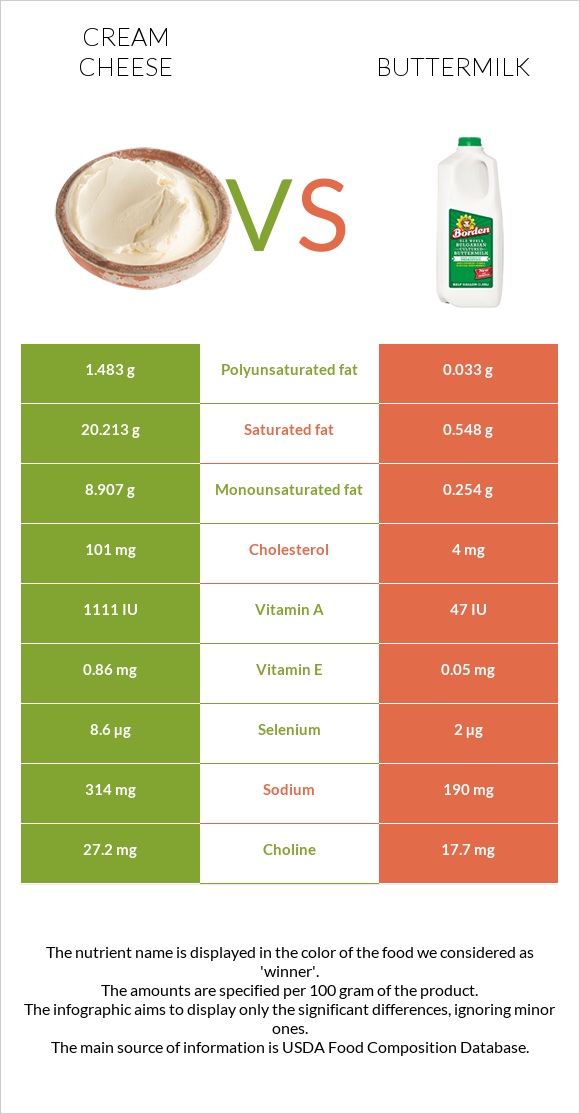Cream cheese vs. Buttermilk — In-Depth Nutrition Comparison
Compare
A recap on the differences between cream cheese and buttermilk
- Cream cheese is higher than buttermilk in vitamin A, selenium, vitamin B2, vitamin E, polyunsaturated fat, and monounsaturated fat.
- Cream cheese covers your daily saturated fat needs 98% more than buttermilk.
- Cream cheese contains 45 times more polyunsaturated fat than buttermilk. While cream cheese contains 1.483g of polyunsaturated fat, buttermilk contains only 0.033g.
- The amount of saturated fat in buttermilk is lower.
Food varieties used in this article are Cheese, cream and Milk, buttermilk, fluid, cultured, lowfat.
Infographic

Infographic link
Mineral Comparison
Mineral comparison score is based on the number of minerals by which one or the other food is richer. The "coverage" charts below show how much of the daily needs can be covered by 300 grams of the food.
| Contains more IronIron | +120% |
| Contains more CopperCopper | +63.6% |
| Contains more ZincZinc | +19% |
| Contains more PhosphorusPhosphorus | +20.2% |
| Contains more ManganeseManganese | +450% |
| Contains more SeleniumSelenium | +330% |
| Contains more MagnesiumMagnesium | +22.2% |
| Contains more CalciumCalcium | +19.6% |
| Contains more PotassiumPotassium | +14.4% |
| Contains less SodiumSodium | -39.5% |
Vitamin Comparison
Vitamin comparison score is based on the number of vitamins by which one or the other food is richer. The "coverage" charts below show how much of the daily needs can be covered by 300 grams of the food.
| Contains more Vitamin AVitamin A | +2100% |
| Contains more Vitamin EVitamin E | +1620% |
| Contains more Vitamin B2Vitamin B2 | +49.4% |
| Contains more Vitamin B3Vitamin B3 | +56.9% |
| Contains more Vitamin B5Vitamin B5 | +88% |
| Contains more Vitamin B6Vitamin B6 | +64.7% |
| Contains more Vitamin KVitamin K | +2000% |
| Contains more FolateFolate | +80% |
| Contains more Vitamin CVitamin C | +∞% |
| Contains more Vitamin B1Vitamin B1 | +47.8% |
All nutrients comparison - raw data values
| Nutrient |  |
 |
DV% diff. |
| Saturated fat | 20.213g | 0.548g | 89% |
| Fats | 34.44g | 0.88g | 52% |
| Vitamin A | 308µg | 14µg | 33% |
| Cholesterol | 101mg | 4mg | 32% |
| Monounsaturated fat | 8.907g | 0.254g | 22% |
| Calories | 350kcal | 40kcal | 16% |
| Selenium | 8.6µg | 2µg | 12% |
| Polyunsaturated fat | 1.483g | 0.033g | 10% |
| Protein | 6.15g | 3.31g | 6% |
| Vitamin B2 | 0.23mg | 0.154mg | 6% |
| Sodium | 314mg | 190mg | 5% |
| Vitamin E | 0.86mg | 0.05mg | 5% |
| Vitamin B5 | 0.517mg | 0.275mg | 5% |
| Phosphorus | 107mg | 89mg | 3% |
| Calcium | 97mg | 116mg | 2% |
| Vitamin B6 | 0.056mg | 0.034mg | 2% |
| Vitamin K | 2.1µg | 0.1µg | 2% |
| Choline | 27.2mg | 17.7mg | 2% |
| Vitamin C | 0mg | 1mg | 1% |
| Potassium | 132mg | 151mg | 1% |
| Iron | 0.11mg | 0.05mg | 1% |
| Copper | 0.018mg | 0.011mg | 1% |
| Zinc | 0.5mg | 0.42mg | 1% |
| Vitamin B1 | 0.023mg | 0.034mg | 1% |
| Folate | 9µg | 5µg | 1% |
| Net carbs | 5.52g | 4.79g | N/A |
| Carbs | 5.52g | 4.79g | 0% |
| Vitamin D | 0 IU | 1 IU | 0% |
| Magnesium | 9mg | 11mg | 0% |
| Sugar | 3.76g | 4.79g | N/A |
| Starch | 0.35g | 0% | |
| Manganese | 0.011mg | 0.002mg | 0% |
| Vitamin B3 | 0.091mg | 0.058mg | 0% |
| Vitamin B12 | 0.22µg | 0.22µg | 0% |
| Tryptophan | 0.069mg | 0.042mg | 0% |
| Threonine | 0.233mg | 0.141mg | 0% |
| Isoleucine | 0.324mg | 0.171mg | 0% |
| Leucine | 0.657mg | 0.313mg | 0% |
| Lysine | 0.567mg | 0.277mg | 0% |
| Methionine | 0.191mg | 0.087mg | 0% |
| Phenylalanine | 0.291mg | 0.171mg | 0% |
| Valine | 0.395mg | 0.217mg | 0% |
| Histidine | 0.175mg | 0.1mg | 0% |
| Omega-3 - EPA | 0.01g | 0g | N/A |
| Omega-3 - ALA | 0.125g | N/A | |
| Omega-3 - DPA | 0.02g | 0g | N/A |
| Omega-3 - Eicosatrienoic acid | 0.002g | N/A | |
| Omega-6 - Gamma-linoleic acid | 0.002g | N/A | |
| Omega-6 - Dihomo-gamma-linoleic acid | 0.036g | N/A | |
| Omega-6 - Eicosadienoic acid | 0.007g | N/A | |
| Omega-6 - Linoleic acid | 0.807g | N/A |
Macronutrient Comparison
Macronutrient breakdown side-by-side comparison
Protein:
6.15 g
Fats:
34.44 g
Carbs:
5.52 g
Water:
52.62 g
Other:
1.27 g
Protein:
3.31 g
Fats:
0.88 g
Carbs:
4.79 g
Water:
90.13 g
Other:
0.89 g
| Contains more ProteinProtein | +85.8% |
| Contains more FatsFats | +3813.6% |
| Contains more CarbsCarbs | +15.2% |
| Contains more OtherOther | +42.7% |
| Contains more WaterWater | +71.3% |
Fat Type Comparison
Fat type breakdown side-by-side comparison
Saturated fat:
Sat. Fat
20.213 g
Monounsaturated fat:
Mono. Fat
8.907 g
Polyunsaturated fat:
Poly. Fat
1.483 g
Saturated fat:
Sat. Fat
0.548 g
Monounsaturated fat:
Mono. Fat
0.254 g
Polyunsaturated fat:
Poly. Fat
0.033 g
| Contains more Mono. FatMonounsaturated fat | +3406.7% |
| Contains more Poly. FatPolyunsaturated fat | +4393.9% |
| Contains less Sat. FatSaturated fat | -97.3% |





